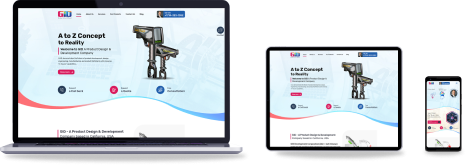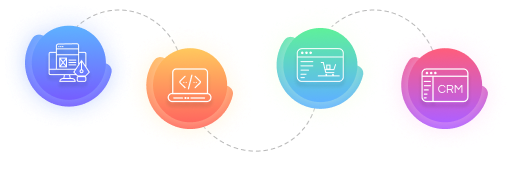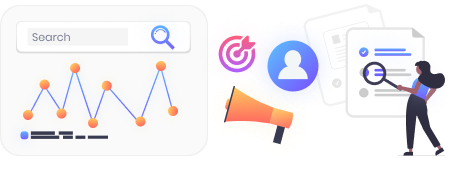
Search Engine Marketing vs. SEO: Which Should You Prioritize in 2025?
In today’s digital age, businesses are constantly seeking innovative ways to reach their target audience and drive growth. Two powerful strategies that have emerged as key players in this landscape are Search Engine Optimization (SEO) and Search Engine Marketing (SEM). While both offer distinct advantages, understanding their nuances and strategic alignment is crucial for businesses aiming to maximize their online visibility and ROI in 2025.
Understanding the Basics
Before delving into the complexities of SEO vs. SEM, let us briefly recap their core concepts:
Search Engine Optimization (SEO): This organic approach focuses on optimizing your website to improve its ranking in search engine results pages (SERPs). By implementing various techniques such as keyword research, on-page optimization, and link building, businesses can attract organic, or unpaid, traffic to their site. SEO is a long-term strategy that aims to build authority and relevance for a website over time, making it a cost-effective way to generate sustainable traffic. SEO can include strategies like creating high-quality content, improving site structure, and ensuring your website is mobile-friendly.
Search Engine Marketing (SEM): This paid advertising strategy involves bidding on keywords to display ads on search engine result pages. Search engine marketing is often referred to as pay-per-click (PPC) advertising because advertisers pay for each click on their ads. SEM allows businesses to target specific keywords and demographics to drive immediate traffic to their website. Unlike SEO, which builds organic traffic over time, SEM delivers instant results, enabling businesses to appear at the top of search results for specific queries as soon as the campaign is live.
While both search engine marketing and SEO are designed to increase visibility in search engines, the approaches differ significantly. SEO is about optimizing a website to earn a top spot organically, while search engine marketing is about purchasing ad space to achieve prominence in search results. Understanding these two strategies is essential for businesses that want to leverage both organic and paid search traffic effectively.
The Role of a Search Engine Marketing Company
Many businesses seek the expertise of a search engine marketing company to help them navigate the complexities of SEM. These companies specialize in creating and managing paid search campaigns, ensuring that businesses get the most value out of their advertising budgets. A search engine marketing company brings expertise in keyword research, ad creation, bid management, and campaign optimization, helping businesses target the right audience at the right time. By working with a professional SEM provider, businesses can maximize their ROI and generate high-quality leads faster than through organic SEO efforts alone.
Search Engine Marketing Services for 2025
As the digital landscape continues to evolve, search engine marketing services are becoming more advanced and tailored to specific business needs. With new tools, technologies, and platforms emerging, businesses now have access to more refined targeting options, including geographic, demographic, and behavioral targeting. This enables businesses to reach their ideal customers with precision and increase the likelihood of conversions. In 2025, search engine marketing services will likely include AI-driven tools and automation, making it even easier to optimize ad campaigns and track performance in real time.
In conclusion, understanding the differences between SEO and SEM is critical for businesses seeking to grow their online presence. While SEO is a long-term, organic strategy that builds traffic over time, search engine marketing offers immediate visibility through paid ads. For businesses aiming to achieve a comprehensive digital marketing strategy, combining both approaches with the help of a search engine marketing company and leveraging advanced search engine marketing services will be key to staying competitive in 2025.
Read Also: Choosing a Digital Marketing Service Provider for WordPress Success
The Synergy Between SEO and SEM
While SEO and SEM may seem like competing strategies, they can actually complement each other effectively. By combining these two approaches, businesses can achieve a more comprehensive digital marketing strategy. When used together, search engine marketing and SEO can help businesses maximize their online visibility, drive traffic, and increase conversions. Understanding how both strategies work in harmony is key to building a balanced and successful digital presence.
SEO: The Long-Term Investment
SEO is a long-term strategy that requires consistent effort and patience. It involves optimizing your website’s content, structure, and technical aspects to improve its ranking in search engine results. SEO may take longer to produce results compared to search engine marketing, but the benefits it provides over time are substantial. The initial investment in SEO may be lower in terms of costs, but once implemented, the strategy pays off by generating ongoing organic traffic without the need for continual spending.
Key Benefits of SEO:
Increased Organic Traffic: The most significant benefit of SEO is its ability to generate organic traffic. As your website climbs higher in search results, more users will find and visit your site. Unlike paid ads, which stop once you stop paying, the benefits of SEO continue to accumulate over time. As your site ranks higher for relevant keywords, it attracts consistent traffic without additional investment.
Improved Brand Visibility: SEO works to improve not just your website’s ranking, but also your brand’s overall visibility and credibility. A high-ranking website signals to potential customers that your business is reputable and trustworthy. This is especially important for businesses looking to build long-term relationships with customers. Being on the first page of search results makes it easier for customers to find you, thus boosting brand awareness.
Higher Conversion Rates: Organic traffic tends to have higher conversion rates than paid traffic because users are actively searching for specific products or services. When users find your website through organic search, they are often more engaged and ready to convert, as they have already expressed interest in your offerings.
Cost-Effective: Once you have optimized your website for SEO, you can continue to reap the benefits without having to pay for ongoing advertising costs. While SEO requires an investment of time and effort, it can be highly cost-effective overall. With effective SEO practices, your website will attract traffic without the ongoing costs associated with search engine marketing campaigns.
SEO is an essential part of a balanced digital marketing strategy because it builds long-term value. However, it requires a sustained effort and patience to see significant returns. This is where search engine marketing comes in, offering quick wins that complement SEO’s longer-term benefits.
SEM: The Quick Win
Search engine marketing (SEM) is a more immediate strategy that can deliver quick results. Unlike SEO, which takes time to show results, SEM allows businesses to quickly appear at the top of search engine results by bidding on relevant keywords. By paying for ads, you can instantly drive targeted traffic to your website. This makes SEM an ideal complement to SEO for businesses that need fast results.
Key Benefits of SEM:
Immediate Results: One of the most appealing aspects of search engine marketing is its ability to generate traffic and leads almost instantly. Once your SEM campaign is live, your ads can appear in search results, driving visitors to your site right away. This is a major advantage over SEO, which can take weeks or months to show tangible results. If you are looking to boost visibility quickly, SEM can be the perfect solution.
Targeted Reach: Search engine marketing allows businesses to target their ads precisely to their desired audience. You can set parameters based on demographics, interests, location, and behavior. This targeting ensures that your ads reach the right people, making SEM a highly effective tool for generating relevant traffic. Unlike SEO, where you rely on organic ranking, SEM gives you full control over who sees your ads.
Measurable Results: SEM campaigns offer measurable results, allowing businesses to track metrics such as clicks, impressions, and conversions. This data helps you evaluate the effectiveness of your campaigns and make data-driven decisions. With search engine marketing, you can easily adjust your bids, keywords, and ad copy to optimize performance. This level of control and visibility makes SEM a highly flexible and adaptable marketing strategy.
Flexibility: SEM campaigns are incredibly flexible. Unlike SEO, which involves making changes to your website over time, search engine marketing campaigns can be adjusted quickly to reflect shifting market conditions, seasonal trends, or business goals. For example, if a business has a limited time offer or promotion, SEM can immediately drive traffic to those pages, creating an urgency that motivates users to act. The ability to pause, modify, or reallocate budgets allows businesses to maximize their SEM investments in real time.
For businesses seeking immediate visibility and tangible results, search engine marketing is an excellent solution. However, because SEM requires ongoing investment in paid ads, it is not a one-time strategy, but a continuous process. As such, integrating search engine marketing with SEO provides a well-rounded, sustainable approach to digital marketing.
Hire Search Engine Marketing Agency?
Contact Us Today!The Synergy Between SEO and SEM
The true power of SEO and SEM lies in their ability to complement each other. Search engine marketing provides immediate traffic and visibility, while SEO offers long-term organic growth. Together, these two strategies can cover all stages of the marketing funnel, from generating awareness to driving conversions.
A balanced digital marketing strategy involves aligning your SEO efforts with your SEM campaigns. For example, while you are working to improve your website’s organic rankings, you can use search engine marketing to capture immediate leads and traffic. Over time, as your SEO efforts begin to pay off, you can scale back your SEM spend and rely more heavily on organic traffic. Conversely, if you need a boost in traffic for a seasonal campaign or new product launch, search engine marketing can provide the necessary short-term results.
Working with a Search Engine Marketing Company
To fully leverage both strategies, many businesses turn to a search engine marketing company. These companies can help develop, implement, and manage both SEO and SEM campaigns, ensuring a cohesive digital marketing strategy. A search engine marketing company will optimize both organic search strategies and paid advertising efforts to create synergy between the two. By working with a professional SEM provider, businesses can ensure that they are getting the most out of their combined SEO and SEM efforts, maximizing their ROI in the process.
Read Also: The Cost-Effective Benefits of Custom WordPress Website Development for Long-Term Success
Which Should You Prioritize in 2025?
As businesses look to optimize their digital presence in 2025, the question of whether to prioritize Search Engine Optimization (SEO) or Search Engine Marketing (SEM) is one that many face. Both strategies play a vital role in online marketing, but the decision of which to focus on depends on numerous factors such as your business goals, budget, and the competitive landscape. However, a balanced approach that incorporates both SEO and SEM is often the most effective strategy to achieve long-term success in digital marketing.
Before diving into the details, it is important to note that search engine marketing can work in tandem with SEO to deliver optimal results. This synergy between SEO and SEM is what allows businesses to gain immediate traffic from paid ads while also building long-term organic rankings. Let us explore in detail when to prioritize SEO and when SEM should take precedence, and how a combination of the two can maximize your online visibility and ROI.
Consider Prioritizing SEO if:
1. You have a long-term perspective:
If your business is looking for long-term growth, SEO should be a priority. SEO is inherently a sustainable strategy, focused on improving your website’s organic ranking over time. Unlike search engine marketing, which provides immediate visibility through paid ads, SEO builds authority and relevance in search engines gradually. The process includes on-page optimization, technical improvements, content creation, and building quality backlinks, all of which enhance your website’s visibility overall.
SEO is not a quick-fix strategy, and it requires patience. However, its long-term benefits are undeniable. Once you establish a strong SEO foundation, the results continue to grow and build upon themselves. The higher your organic ranking, the more organic traffic you will generate, and the less reliant you will be on paid ads. As search engines continue to evolve, SEO practices adapt to ensure your website maintains its competitive edge in the results.
2. You have a limited budget:
When budget constraints are a consideration, SEO is often the more cost-effective option. While SEM involves continuous spending on ads, SEO delivers lasting value over time with a one-time investment in optimization efforts. Although SEO may take time to show results, once your website is optimized for search engines, you do not have to pay for clicks or impressions.
In contrast, search engine marketing requires ongoing investments to maintain visibility in the search results. You need to bid on relevant keywords consistently, and if you stop running your SEM campaigns, your traffic will immediately drop. Therefore, if your budget is limited and you are looking for a strategy that provides long-term benefits without incurring ongoing costs, SEO is the better choice.
3. You want to build brand authority:
SEO is a powerful tool for establishing your brand as an authority in your industry. Search engines tend to rank authoritative and trustworthy websites higher in search results. By investing in SEO, you can enhance your website’s reputation, improve its domain authority, and build trust with your audience. SEO helps you position your brand as a thought leader in your niche, creating a positive perception of your business that can drive customer loyalty and increase brand recognition.
Unlike paid search ads, which are temporary, organic rankings signal credibility and relevance. This level of trust is especially important for businesses that want to foster long-term relationships with their customers. Organic traffic tends to result in higher engagement and conversion rates because users trust organic search results more than paid ads. Search engine marketing may provide immediate visibility, but SEO is what ultimately builds a lasting reputation.
Consider Prioritizing SEM if:
1. You need immediate results:
If your business requires immediate visibility, search engine marketing is the best option. Unlike SEO, which takes time to show results, SEM can generate traffic and leads as soon as your ads go live. By bidding on relevant keywords, you can quickly appear at the top of the search results for those queries, driving instant traffic to your website.
This is particularly beneficial for time-sensitive campaigns, such as product launches, seasonal offers, or promotions. SEM can help you achieve a quick return on investment (ROI) by targeting customers who are actively searching for products or services similar to yours. For businesses that need to meet short-term goals or create an immediate presence, search engine marketing is the ideal solution.
2. You have a specific campaign or promotion:
If your business is running a specific campaign or promotion, SEM allows you to target highly specific keywords and demographics. Whether it is a holiday sale, product launch, or limited-time offer, SEM enables you to drive immediate traffic to a dedicated landing page, boosting conversion rates.
With search engine marketing, you can control when and where your ads appear, tailoring your campaigns to meet the goals of your promotion. You can target specific geographic locations, customer interests, and even behavioral patterns, ensuring that the right audience sees your ads at the right time. If your business is focused on achieving specific, short-term objectives, SEM is a powerful tool for driving traffic and achieving those goals.
3. You want to measure ROI directly:
One of the biggest advantages of search engine marketing over SEO is the ability to measure ROI directly. With SEM, you can track every aspect of your campaign—from clicks and impressions to conversions and cost-per-click (CPC). This data allows you to understand exactly how well your campaign is performing and adjust it in real time.
With SEO, it can be harder to pinpoint the exact impact of specific activities, as rankings and organic traffic are influenced by numerous factors. SEM provides granular insight into the effectiveness of your campaigns, enabling you to make data-driven decisions and optimize your budget allocation. If you want to track specific goals and measure ROI in real-time, search engine marketing offers the precision you need.
The Ideal Approach: A Synergistic Combination
While there are clear scenarios where businesses should prioritize SEO or SEM, the most effective approach for most companies in 2025 will be a combination of both strategies. By leveraging the strengths of search engine marketing and SEO, you can maximize your online visibility, drive more traffic, and achieve higher conversion rates. Combining the two allows you to cover both short-term needs and long-term growth objectives.
Here is how you can integrate SEO and SEM for optimal results:
1. Keyword Research:
The foundation of both SEO and SEM lies in keyword research. Identifying the right keywords for both organic search and paid campaigns ensures that your content aligns with the terms your target audience is searching for. Search engine marketing can help you identify high-converting keywords, while SEO allows you to optimize your site to rank for those terms organically. By conducting in-depth keyword research, you can ensure that your content strategy is aligned with your paid campaigns.
2. Content Marketing:
Content is key in both SEO and SEM. For SEO, creating high-quality, informative content is critical to ranking well in organic search results. For SEM, creating compelling ad copy that resonates with your audience will drive clicks and conversions. Integrating SEO-friendly content into your SEM landing pages and ads will create a seamless experience for visitors, improving the overall effectiveness of your digital marketing strategy.
3. Link Building:
Link building is a fundamental aspect of SEO. By acquiring high-quality backlinks from authoritative websites, you can boost your website’s domain authority and search engine rankings. While SEM does not directly impact backlinks, running paid campaigns can increase your website’s visibility, potentially leading to organic backlinks. Search engine marketing can give you the exposure needed to attract natural links, which can support your SEO efforts.
4. Landing Page Optimization:
Optimizing landing pages for both organic and paid traffic is essential for improving conversion rates. Ensure that your landing pages are designed with both search engine marketing and SEO in mind. For SEM, focus on providing clear, persuasive content that aligns with your ad copy. For SEO, ensure that the page is optimized for relevant keywords, fast-loading, and user-friendly. This integrated approach ensures that both paid and organic traffic experiences a seamless journey from click to conversion.
5. Track and Analyze:
Both SEO and SEM require ongoing monitoring and optimization. By regularly analyzing key metrics such as organic traffic, paid traffic, bounce rates, and conversion rates, you can identify opportunities for improvement in both strategies. Use tools like Google Analytics to track the performance of both SEO and SEM efforts and make data-driven decisions to optimize your campaigns for better results.
Why Choose Concept Infoway for Website SEO Optimization?
As a leading search engine marketing company, Concept Infoway specializes in providing comprehensive search engine marketing services to help businesses achieve their online marketing goals. Our team of experienced SEO experts has a proven history of delivering exceptional results for clients across various industries.
Here is why you should choose Concept Infoway for your SEO optimization needs:
In-Depth Keyword Research: We conduct thorough keyword research to identify the most relevant keywords for your target audience, ensuring that both SEO and SEM efforts align.
On-Page Optimization: Our team optimizes your website’s title tags, meta descriptions, header tags, and content to improve its search engine visibility and relevance.
Off-Page Optimization: We build high-quality backlinks from authoritative websites to enhance your website’s domain authority and improve search rankings.
Technical SEO: We ensure your website is technically sound and optimized for search engines, ensuring fast load times and an exceptional user experience.
Local SEO: We help you optimize your website for local search, attracting customers in your specific geographic area and improving your visibility in local results.
Regular Reporting: We provide detailed reports on the performance of your SEO campaigns, including key metrics like organic traffic, rankings, and conversions.
By partnering with Concept Infoway, you can be confident that your website will be optimized for both short-term and long-term success.
Frequently Asked Questions – FAQs
What is Search Engine Marketing (SEM)?
Search Engine Marketing (SEM) refers to the practice of using paid advertising to increase a website’s visibility on search engine results pages (SERPs). It involves bidding on keywords relevant to your business, allowing your ads to appear when users search for those terms. SEM is also known as pay-per-click (PPC) advertising.
What is SEM vs SEO?
While SEM and SEO both aim to improve a website’s visibility on search engines, they differ in their approach:
SEO (Search Engine Optimization) focuses on optimizing your website to improve its organic (unpaid) rankings in search results through techniques like keyword optimization, content creation, and backlink building.
SEM, on the other hand, involves paid advertising, where you bid on keywords to have your ads displayed at the top of the search results, driving paid traffic to your site.
How effective is Search Engine Marketing?
Search Engine Marketing can be highly effective, especially for businesses seeking immediate visibility and traffic. SEM campaigns allow businesses to target specific keywords and demographics, yielding quick results. The ability to track and measure performance through data also makes SEM a powerful tool for achieving measurable outcomes like lead generation and conversions.
What are the benefits of Search Engine Marketing?
The key benefits of SEM include:
- Immediate Traffic: SEM generates instant visibility and traffic as soon as the campaign is launched.
- Targeted Reach: Ads can be tailored to specific keywords, locations, devices, and demographics.
- Measurable Results: SEM provides clear data on performance, including clicks, impressions, and conversions, making it easier to gauge ROI.
- Flexibility: SEM campaigns can be easily adjusted to optimize performance or align with changing business goals.
How much does it cost to do SEM?
The cost of SEM varies depending on factors like the competitiveness of the keywords you are bidding on, the industry, and your campaign’s geographic targeting. Costs are typically determined on a cost-per-click (CPC) basis, where you pay each time, someone clicks on your ad. The average cost can range from a few cents to several dollars per click, depending on the keyword’s competitiveness.
Why can SEM make a difference to online businesses?
SEM can make a significant difference for online businesses by providing immediate visibility in competitive markets. It allows businesses to appear in top positions on search engine results pages, driving targeted traffic and increasing brand awareness. With the ability to control bids and target specific demographics, SEM ensures that businesses reach the right audience at the right time, helping to boost conversions and sales.
Is Search Engine Optimization important for business?
Yes, SEO is crucial for businesses. It helps improve organic search rankings, driving consistent and cost-effective traffic over time. By optimizing your website for search engines, you increase your visibility, enhance brand credibility, and attract high-quality leads. SEO is an essential long-term strategy for businesses looking to build authority, increase website traffic, and ultimately grow their online presence.
Conclusion
In 2025, a balanced digital marketing strategy that combines search engine marketing and SEO is essential for businesses to thrive in the competitive online landscape. By understanding the strengths and limitations of each approach, businesses can make informed decisions to maximize their online visibility and ROI. Whether you choose to prioritize SEO for long-term growth or SEM for immediate results, a synergistic combination of both strategies will provide the most comprehensive and effective digital marketing solution.
If you are looking for a dependable search engine marketing company to help you optimize your website and achieve your digital marketing goals, consider partnering with Concept Infoway. Our team of experts is dedicated to delivering exceptional results and helping you stay ahead of the competition.

SEO Agencies vs In-House Teams: Which Drives Better Results?













